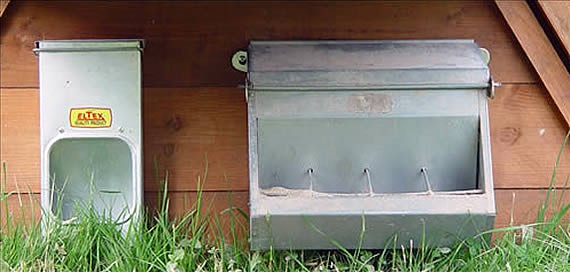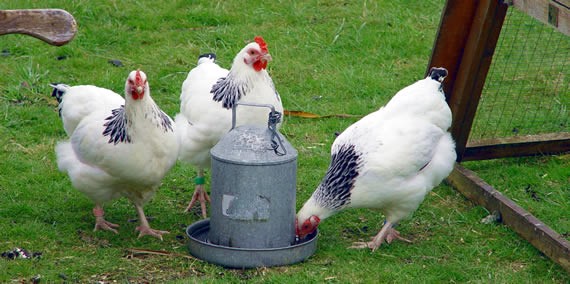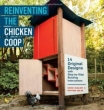Poultry Food & Drink
In the "olden days", hens may have been fed on scraps, but if you want decent egg production, you must feed a good, balanced diet. For most of us, that means a proprietary feed. As with houses, there are lots of poultry feeds on the market, many aimed specifically at smallholders.
Organic and GM-free feeds are available, and a layer pellet containing the poultry wormer “Flubenvet” has recently become available.
Pellets and mash
Layer pellets are easiest to feed, either from a hopper or scattered on the ground. However, feeding on the ground can be wasteful and encourage vermin and wild birds if not all cleared up; with a hopper, feed can be available on an ad-lib basis and, if you place it in a sheltered area, it is protected from weather and wild birds.
Layer mash, which is basically powdered pellets, is also available but it tends to get damp, sour and lumpy. Mash is usually fed in intensive systems so that the hens take longer to feed and have less time for unsavoury pursuits such as feather pecking.
 Grit and feed hoppers
Grit and feed hoppers
Layer pellets should only be fed to birds that are in lay – the pellets are supplemented with calcium, an excess of which can result in kidney failure.
Corn for hens
You can also feed corn (wheat) as a treat, at about 25g per hen per day, and preferably in the evening. If you think of the layers pellets as being the "meat and two veg" and the corn as the "chocolate mousse", you get the idea - the corn should be a treat.
Feeding it in the evening encourages the wanderers to head back to the henhouse and it means that they go to roost with a full crop, keeping them content during the night. If you offer corn in the morning, the hens will ignore the nutritionally balanced but boring pellets! Too much corn makes hens fat, and fat hens are unhealthy and less likely to lay well.
Keep all feed in rodent-proof containers and take feed hoppers in at night to discourage unwelcome visitors.
Other food for hens
Your hens will also have a varied diet of seeds, slugs, snails, worms, bugs and grass. Eating long grass can cause problems for poultry by becoming impacted in the crop, so try to keep them on short grass if possible.
If your hens don't have access to much grass, give them greens such as lettuce, cabbage and sprouts, including the stems, and carrots. Hang them up so that they don't waste them. A corn cob is always well received as are sunflower seeds, on or off the plant; if you grow sunflowers, let them seed then hang the seed-heads up for your hens.
Meat products and catering waste i.e. food that has been through a kitchen must NEVER be fed to poultry because of the risk of disease.
We were told to try to get them to take oil while they were moulting to help with feather regrowth, so we hit on the idea of sardines in sunflower oil. We mix the sardines with wholemeal bread to sop up all the juices. However, this is fed once a week as a treat.
Poultry grit
Poultry also need access to grit and tiny stones, to aid digestion; hens have no teeth so the grit lies in the crop and helps grind up the hens’ food. Free-range hens will access these naturally, but it’s best to offer some mixed with oyster shell.
Layer pellets already contain calcium for shell formation, but additional oyster shell can be offered, either on its own or as part of mixed grit. Grit can be fed from a hopper or from a flowerpot saucer or similar.
Water for poultry
Poultry must always have access to fresh, clean water and they drink a surprising amount of water, especially on hot days. Drinkers made from plastic, galvanised metal or glass (not a great idea!) are available but hens seem equally happy drinking from puddles, the birdbath, the sheep trough or just about any 'natural' source. However, the blue-green algae which forms on stagnant water can be fatal, so keep hens away from it.
In extreme weather conditions, either hot or cold, water may need attention several times a day. Hens don’t like hot water, so in icy weather, you will have to break the ice during the day. Empty drinkers at night, so that they don’t freeze solid by morning – better than spending ten minutes in the morning trying to break them open.
 Keep water feeders topped-up at all times
Keep water feeders topped-up at all times
Adding garlic to the water is supposed to reduce worm infestations and cider vinegar can be added as a general tonic. Cider vinegar works by making the gut acid, which bacteria and most intestinal parasites cannot tolerate – use 10ml of vinegar / 500ml of water BUT only use cider vinegar in non- galvanised containers as the acid attacks and dissolves the zinc in galvanised containers, which then poisons the hens.

About Rosemary Champion
Rosemary lives on a 12 acre smallholding in Angus, in the east of Scotland, where she keeps Ryeland Sheep, Shetland cattle and assorted poultry. She was destined to be a smallholder from an early age.
Further Reading
 Chicken & Eggs: River Cottage Handbook No.11 Mark Diacono |  Storey's Guide to Raising Chickens Gail Damerow |  A Beginners Guide to Caring for Ex-Batts Jo Barlow |  Reinventing the Chicken Coop Matthew Wolpe |  Chickens: The Essential Guide to Choosing and Keeping Happy, Healthy Hens Suzie Baldwin |
Smallholding shop
When you click links below and make a purchase, this may result in this site earning a commission from eBay.

Poultry Septi Clense Powder
… from £7.44 + p&p

vital Vits - 250ml
High concentrate of… from £5.58 + p&p

Brinsea Eco Glow 20 Brooder
The EcoGlow 20 chick… from £44.03 + p&p

Poultry net kit - 50M
Complete Poultry fencing kit.… from £229.44 + p&p



















